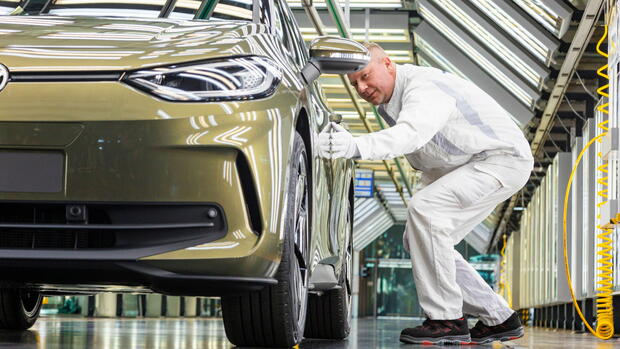Car production at the VW site is up for debate.
(Photo: IMAGO/Sylvio Dittrich)
Düsseldorf, Berlin The car manufacturer Volkswagen will soon stop vehicle production in the smallest of its plants. The “Gläserne Manufaktur” in Dresden no longer plays a role in the ongoing round of restructuring the core VW brand, as Handelsblatt has learned from corporate circles. However, the company will not give up the location. Alternative uses are being worked on.
There are currently around 300 employees in Dresden. Last year, just 6,500 electric vehicles of the ID.3 model were produced in the factory production – 25 units per working day.
It is said in the circles that nothing has been decided on the matter yet. A Volkswagen spokeswoman said they were not taking part in speculation: “The Volkswagen Passenger Cars brand is currently developing a detailed package of measures to implement a performance program without any outcome.” She was also responding to a report in “Automobilwoche” from the weekend.
Volkswagen: Car production in Dresden has been under discussion for a long time
The first measures of this program must be in place by the group’s next round of investment planning in November at the latest. In addition, the location-independent agreement to secure employment at VW will remain in effect until 2029.
In Wolfsburg, there has been a lot of talk about stopping production at the Saxon location for a long time. Already in June, the Handelsblatt reported, citing corporate circles, that production in Dresden was on the brink. The location is “a beautiful property,” reported a high-ranking manager some time ago. “But do we have to build cars there? I don’t know it.”
It is therefore likely that the location itself will be retained and the employees will be given other tasks. The VW workforce in Dresden is considered highly qualified.
>> Read also: Blume’s test of patience – VW boss expects lengthy corporate restructuring
The Transparent Factory was a project close to the heart of VW patriarch Ferdinand Piëch, who died in 2019. The foundation stone was laid in 1999 in the presence of then Chancellor Gerhard Schröder. The final assembly of the Phaeton luxury sedan took place at the location until 2016. With the model, Piëch wanted to take the brand to the upper end of the quality scale – to Mercedes and BMW.
The plan failed and the Phaeton remained a niche product. VW then manufactured the E-Golf in Dresden, and the all-electric ID.3 has been produced there since 2021 as a supplement to the main production in Zwickau.
In Zwickau, the contracts of 269 temporary employees were not extended last week due to the reluctance to buy electric cars. The future of almost 2,000 additional temporary workers is currently uncertain and depends on the further market situation.
According to dealer and corporate circles, the number of new orders for electric cars from VW is currently low. In the summer, incoming orders were 30 to 70 percent below the planned level, depending on the model. The company did not want to comment on the figures at the time.
In an interview with the Handelsblatt, CEO Oliver Blume left details about a possible workforce reduction at Germany’s largest car manufacturer. When asked whether VW still needed each of its German plants, the CEO said: “We are concentrating on our permanent staff and existing location safeguards. In some places we have technical overcapacity. On the other hand, our product portfolio is broad.”
The final occupancy of each factory is a complex interplay of “product planning, realistic sales planning and the general conditions of each location”. Then you decide.
More: Volkswagen is cutting jobs in Zwickau – the future of 2,000 additional temporary employees is uncertain

